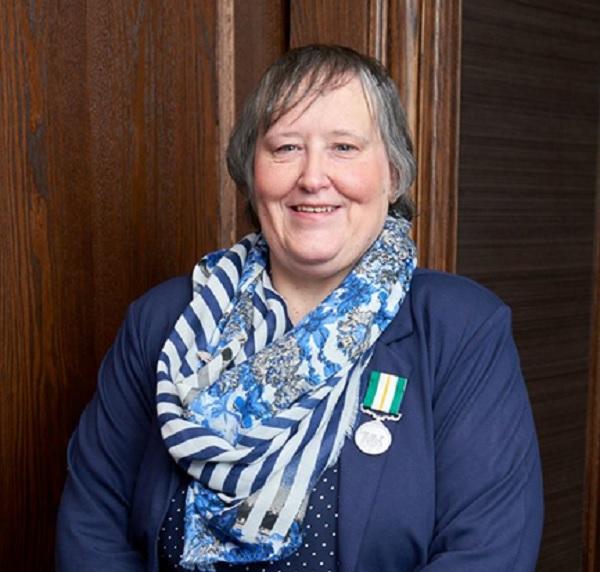
Pierrette Vezina, volunteer coordinator at Wabano Centre for Aboriginal Health in Ottawa, has played many roles over the years. One of the things she’s most proud of is helping to create a meaningful place for other people at Wabano, to help them get better connected to each other, themselves, and the programs and services around them. After she received the Ontario Medal for Good Citizenship in January, we spoke to Vezina, who is Métis, about building a program to increase the number of active volunteers from 14 to more than 400, growing one of Wabano’s volunteer programs into a chocolate-based social enterprise that helps bring in money for other programs, and what the work means for people’s health and wellbeing.
Can you tell us a bit about how you got started at Wabano?
I had to retire because of medical reasons, but I was looking for something to do, as a therapy really. And Wabano called to me. At first, I was working with the seniors program they had started here with the Elders. I worked for them for about three or four years and I loved it. I had practised as a Therapeutic Recreologist and Music Therapist in my career, and so I was able to bring some of my skills here to help them. Then I heard they were looking for someone to fill the role of volunteer coordinator. So I said, “You know, I could help you out with that a couple of days a week.”
It’s now been four years that I’ve been the volunteer coordinator. For me, that role has meant a lot. I have chronic pain, but when I’m here at Wabano, I don’t feel it. Being here helps me feel better. So Wabano has done a lot for me, too.
We can’t hide the fact we have a real sweet tooth. Can you tell us more about the Wabano Fine Chocolates social enterprise and what it means to have a volunteer program evolve like this?
I’m a trained chocolatier, and I was trying to find creative ways to show the volunteers that we appreciate them, so I made chocolates, and it started out as a gift. Then I thought, well, maybe this could become something bigger. But it grew very slowly. I taught people how to make chocolate, and we started by producing prizes for programs, or as little gifts.
Now we are actually getting contracts because people really love our chocolates. We worked hard to develop our flavours. It’s a totally Indigenous program, so we have chocolates that tell stories of our culture, and we have chocolates with teachings. People really liked that. The program is youth-oriented, and includes volunteers facing barriers. Also all the money made goes back into supporting programming.
Can you explain your approach to volunteerism, and how it might differ from other organizations?
Volunteerism is such a big word, but in our culture, the tradition is helping, and being a helper. So if a neighbour needed fish, you’d go and help them catch fish, you know. That’s what living in a community is all about. And that’s what is so great about Wabano: we do everything in a community.
I spend some time with incoming volunteers to get to know them and what they’re passionate about. Then I try to find the perfect job for them where they’re going to be happy and where they can use their talents, and we can nourish those talents. Sometimes I even create a role so someone can learn while they can give back to Wabano.
Can you give us an example?
Graphic artist. I had a young person who is a talented artist, so we had her create a few cartoons for educational purposes, and some wrapper designs for the chocolate program, and things for the Wabano galas. It was something she really loved to do, and gave her a chance to use her artistic ability to address design needs at Wabano.
What do you think of the connection between social interaction and health, especially for seniors?
What seniors are really missing is people talking to them. A lot of times with seniors, the main issue is loneliness: they’re isolated, and it’s important to engage them. Especially with Indigenous seniors, a lot of people have had trauma, from residential schools and other things, they’re dealing with mental health issues, they’re living under the poverty line, but one of the things they need the most is a place of belonging, and that’s where Wabano comes in.
We welcome people who’ve faced intergenerational trauma, and people who’ve had trouble with the law, and we try to help them get their lives back, to change their story, and give them a chance to accomplish things. We also have people with physical and mental disabilities, and they have so much to offer, they just need a safe place to do that.
So, the Wabano environment is what helps to nurture rich volunteer opportunities for community members?
It’s the people here, and the vision of our Executive Director [Allison Fisher], and our Board, for this to be a place of belonging, for this to be a place where people feel safe. It’s about the people and the community. One of the big reasons I’ve been here 10 years is because I believe in what they do, and I’ve seen Wabano make a difference in people’s lives.
--To learn about volunteer opportunities and more, visit Wabano’s website or email Pierrette Vezina at volunteer@wabano.com. And we hear that she knows where to find the Wabano Fine Chocolates, too, in case you're looking to place an order.

